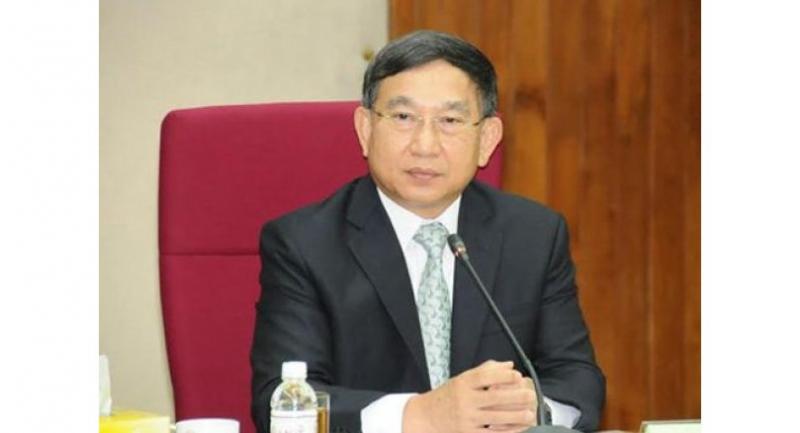Saab, Mitsubishi look to invest in EEC

SWEDISH aerospace and defence company Saab Group and Japanese electric giant Mitsubishi Electric Corporation are keen to join hands with Thai private firms to invest in Thailand’s targeted industries in the country’s Eastern Economic Corridor (EEC), Deputy Prime Minister Prajin Juntong said.
After their discussions yesterday, Saab chief executive officer Hakan Buskhe said that it had discussed with Amata Corporation possible cooperation on maintenance and development of a smart city following Saab’s earlier survey for investment in maintenance, repair and operations (MRO) in the EEC, Prachin said.
Prajin said that Saab, which currently manufactures and exports fighter and commercial aircraft, viewed the EEC as the potential area for its maintenance centre.
Presently, Thailand imports fighter aircraft from Saab, while some of its neighbouring countries including Malaysia and Myanmar use commercial aircraft.
“Thailand has imported Saab aircraft since 2008. But its MRO centre has not been established in the country yet. There’s only a pooling service – a spare parts centre,” Prajin said.
Based on Saab, this possible investment could serve the Asean Economic Community (AEC) as its aircraft are used in several countries, he said, adding that if the Swedish firm decides to invest in Thailand, the Thai aviation industry will gain high benefits.
In his discussion with Mitsubishi Electric, its executive officer in charge of electronic systems Masamitsu Okamura said the company was in discussions with Loxley Plc to make household products using Mitsubishi Electric’s technology in communication satellites, radar and Internet of Thing (IoT)
This move comes after the visit by a delegation of 600 Japanese investors to Thailand last month.
Meanwhile, the State Railways of Thailand (SRT)’s Bangkok-Hua Hin high speed train project was given environmental impact assessment (EIA) approval, while the contracts for five double-track railway projects are expected to be signed later this month.
SRT acting governor Anont Luangboriboon said the recently-approved Bt96-billion 211-kilometre Bangkok-Hua Hin high-speed train project’s EIA was being considered by State Enterprise Policy Office for opening bids under public-private partnership (PPP).
Regarding the Bangkok-Rayong high-speed train project, which will connect three airports for the EEC development, about 90 per cent of project study has been completed.
SRT is ready to present to related parties the study result if the PPP principles in the EEC are confirmed.
Yesterday, SRT also presented to the “superboard” the bidding results of the five double-track railway routes and, according to the board, the SRT could sign contracts with private organisations if all procedures are correct.
SRT will also propose that the Cabinet review details of these five routes and the higher investment budget for the Map Kabao-Chira Junction double-track railway project. It will be raised by about Bt3 billion from the earlier Bt7.06 billion while the overall amount remains at Bt95.8 billion.
The proposals are being considered by the Transport Ministry and related agencies. It will take two weeks before being forwarded to the Cabinet for approval. Contracts are expected to be signed with private organisations late this month.
On the other front, the planned development project for the 277-rai riverside land worth about Bt80 billion has not yet been finalised after the SRT board’s three-hour discussion on Wednesday. Some members proposed higher returns, while some wanted the opening of bids to be speeded up. This issue is expected to be finalised soon.
At the same meeting, the SRT board agreed to have the SRT Electric Train continue the Airport Rail Link’s operation with a Bt349-million budget in the fiscal year 2018, starting October this year, after its contract expired last month, said Suthep Panpeng, deputy director-general of the SRT Electric Train Co, which operates the Airport Rail Link.
The SRT board also agreed to hire Siemens’ representative for maintenance of Airport Rail Link’s railway signalling system for a two-year period for an amount not exceeding Bt142 million. The current contract will expire on November 30.
In fiscal year 2016, Airport Rail Link contributed a total of Bt637 million in fares to the SRT and is expected to make a 7 per cent year-on-year increase in its contribution in fiscal year 2017 as a result of rising passenger volumes.





